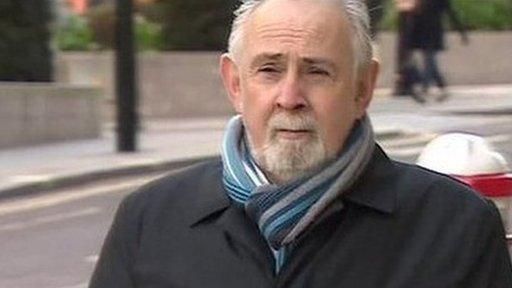On the Run scheme: Theresa Villiers issues warning to suspects
- Published
Secretary of State Theresa Villiers told MPs at the Northern Ireland Affairs Committee that the government was no longer standing by the "on the run" letters because some contained factual errors.
The Northern Ireland secretary has said the government is "no longer standing by" letters sent to 'on the runs'.
The government scheme came to light when one of the letters, which were sent to about 200 Irish republicans, caused an IRA bomb trial to collapse.
Secretary of State Theresa Villiers said those who received letters should no longer rely on them as a defence.
She said it applied to all available evidence against them, "old or new".
Ms Villiers had previously said that the letters would not protect paramilitary suspects from prosecution if fresh evidence emerged against them.
Controversy
Giving evidence to an an MPs' inquiry into the scheme on Wednesday, the secretary of state said that the government was "no longer standing by" the letters because "errors" were made at the time when some of the them were written.
She said they could no longer be relied on "even as statements of fact".
The government letters were addressed to more than 200 republican paramilitary suspects, informing them that they were not being sought by the police for questioning about Troubles-related offences.
"The government no longer stands behind them because we cannot be certain that they were accurate and reliable at the time," Ms Villiers told MPs.
"So there can be no question of looking back at past decisions by prosecutors and the police. What will count is - what is the evidence available today? Does that justify arrest? Does that justify prosecution?
"That decision will be made by today's police and prosecutors regardless of what judgments were made in the past about whether someone was wanted or not.
"Today's decision will be made by today's prosecutors on the basis of all evidence regardless of when it first became available."
The On the Runs scheme became the focus of controversy after the collapse of a case against John Downey in February for the 1982 Hyde Park bombing.

The collapse of John Downey's trial earlier this year sparked the On the Runs crisis
Mr Downey was wrongly told he was not wanted by any UK police force. However, he was still being sought by the Met.
'Abuse of process'
On Wednesday, Ms Villiers gave evidence to the Northern Ireland Affairs Committee at Westminster, which resumed its inquiry into the letters scheme following a summer recess.
She told MPs that she had taken legal advice on the issue and had concluded making a statement to the House of Commons was the best way to "remove barriers" to future prosecutions.
However, the she said that there was no 100% guarantee that the government could prevent a future "abuse of process" or the collapse of a trial.
Committee members repeatedly asked Ms Villiers to identify the recipients of the letters.
However, she refused to reveal their names, saying it could jeopardise potential future prosecutions or put the safety of individuals at risk.
The secretary of state was also asked if the Northern Ireland Office would write new letters to all the paramilitary suspects involved in the on the runs scheme, to inform them of the government's current position.
'Key change'
She said it would be unlikely that her office could get up to date addresses for all of the people involved, and added that she was confident a general statement to parliament was the most effective way of getting the message across.
Ms Villiers told the inquiry: "The key change that we need to make is to make it absolutely clear that the government no longer stands by those statements of fact."
She added: "Whether evidence is old or whether it's new, it's going to be a matter for today's prosecutors to decide whether that justifies arrest and prosecution, so they do not have an effect of protecting people from prosecution in any way."
Shadow secretary of state for Northern Ireland, Ivan Lewis, said there was "an urgent need for the government to clarify its position regarding the on the run scheme".
"At a time when stability in Northern Ireland is so fragile it is essential the government is clear and unambiguous about its response to sensitive issues," he said.
The Northern Ireland Office's permanent secretary, Sir Jonathan Stephens, also appeared before the committee.
In July, a separate review into the scheme by Lady Justice Hallet found that it was flawed but not an amnesty for those who received letters.